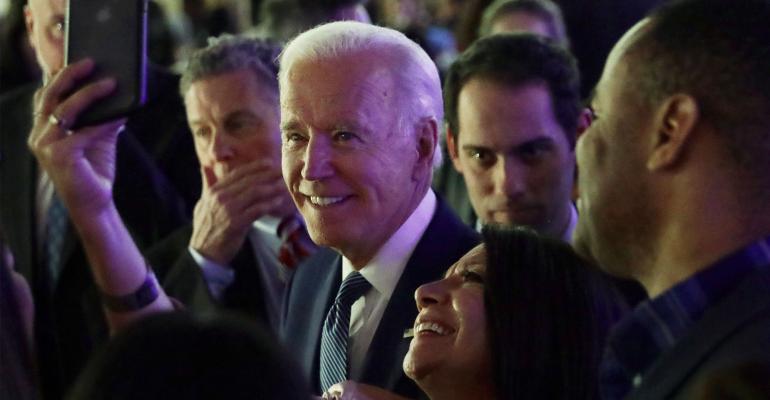(Bloomberg)—Democratic presidential candidate Joe Biden on Monday unveiled a $640 billion housing plan that includes tax credits for first-time homebuyers and low-income renters, as well as more federal assistance for the country’s poorest renters.
The former vice president’s team sees his proposals as especially important in aiding African Americans and Latinos, two advisers said on the condition of anonymity. The plan was released less than a week before the Feb. 29 South Carolina primary, where more than half of Democratic voters are black, but also before Super Tuesday on March 3, when California -- which is facing a dramatic housing and homelessness crisis -- casts its primary votes.
Biden, who has enjoyed strong backing from black voters, is counting on a victory in South Carolina to keep him competitive in the Democratic nomination race after lackluster performances in Iowa, New Hampshire and Nevada. Biden’s longtime lead in the Palmetto State has eroded as Bernie Sanders has gained in recent weeks.
The housing plan would restore several Obama administration policies to fight housing discrimination that were rolled back by President Donald Trump. These include holding major national financial institutions accountable for discriminatory lending practices and restoring the Consumer Financial Protection Bureau’s ability to enforce settlements against lenders found to have engaged in discriminatory practices.
On his first day in office, Biden would direct his housing and urban development secretary to launch a task force to combat homelessness and to back California Representative Maxine Waters’s $13 billion Ending Homelessness Act, the plan says.
The proposal, which would be paid for with tax increases on wealthy individuals and large corporations that Biden’s campaign has already proposed, includes a tax credit of up to $15,000 for first-time homebuyers. Modeled on the temporary credit that was part of the American Recovery and Reinvestment Act in 2009, homebuyers would be able to receive the credit immediately and not have to wait until filing taxes the next year.
Biden would also aim to work with Congress on a tax credit for low-income renters who make too much money to qualify for Section 8 vouchers but still struggle to pay their housing costs. It would aim to reduce rent and utilities to 30% of annual income and would cost $5 billion annually, according to his plan.
It would also fully fund the Section 8 program so that all eligible families can benefit, according to Biden’s campaign. For now, only a quarter of eligible families benefit from the program, but it would ultimately benefit at least 17 million families, his campaign said.
Biden is also proposing the creation of a $100 billion affordable housing fund to build new homes and upgrade existing ones. It would include $65 billion in grants for state housing authorities and the Indian Housing Block Grant program, $10 billion to make existing homes more energy efficient, and $5 billion toward increasing the stock of affordable housing as part of larger community development efforts. It would also include $20 billion for the Housing Trust Fund, paid for with an increase in the assessment on Fannie Mae and Freddie Mac.
Sanders has proposed capping annual rent increases at 3% or 1.5 times the consumer price index, whichever is higher. California and Oregon have passed laws limiting increases to CPI plus 5% and 7%, respectively. A Biden official said that was not an idea that the candidate was considering.
To contact the reporter on this story: Jennifer Epstein in Charleston, South Carolina at [email protected].
To contact the editors responsible for this story: Wendy Benjaminson at [email protected]
Max Berley, Linus Chua
© 2020 Bloomberg L.P.





